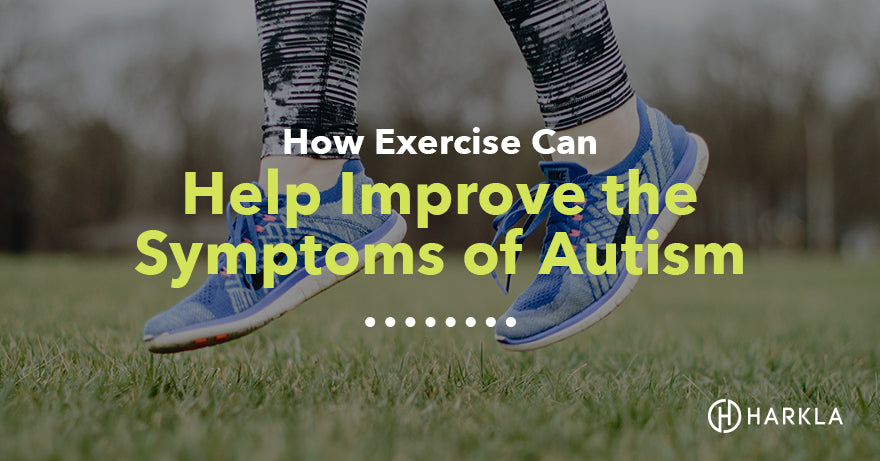Your Cart is Empty

We all know that exercise is important for good health. When you exercise regularly, you help your physical body- your muscles, heart, and lungs- stay healthy and strong.
You also benefit your mental health. Your brain releases endorphins, which help fight against stress and depression. You just overall tend to feel better when you are active!
It can be particularly important for children with autism to exercise, even helping to improve their autistic symptoms. And since children with autism tend to spend more time playing video games and watching tv than their peers, it’s important to make sure they are being active!
A meta-analysis that looked at 16 different studies found that there were “robust benefits of physical exercise on the patients’ motor and social functioning.” To be more specific, they saw a 35% improvement in the ASD symptoms as a result of exercise.
They went on to say that it wasn’t because the physical activity tired the kids out, because their on-task behavior, academic responding, and appropriate motor behavior increased after the exercise.
Another study found that exercise provides a short-term reduction in stereotypical behaviors in children with ASD. This third study was more specific in its findings, in that after exercise, they saw a decrease in aggression, off-task behavior, and elopement.
While there are many things you can do to help your child’s autistic symptoms, like improving their gut bacteria or avoiding MSG, it turns out exercise is a major win that takes relatively little work.
So it appears that overall exercise is a great thing to have as part of your child’s daily routine. And since it helps with their ability to perform better in school, having them do quick exercises before class could be a big win!
What is interesting, and something to take into consideration is that individual exercise programs seem to have a bigger impact than group exercise programs.
One study found that children’s social skills actually improved more in an individual program, which involves only the child and an adult leader, versus being part of a group. This doesn’t mean that group exercise isn’t useful. The study simply showed that individual programs proved more beneficial.
Another factor that studies have looked at is whether the exercise should be intense or mild. It turns out that mild exercise didn’t show much improvement at all on children’s autistic behaviors, but intense exercise had a really good effect.
The first study on mild versus vigorous exercise looked at the difference between 15 minutes of playing with a ball (mild) and 15 minutes of jogging (vigorous). It turns out that the mild exercise had no effect, while the vigorous exercise showed a reduction in stereotypical behaviors.
Another study looked at jogging versus mild exercise and found that physical self-stimulation and “out of seat” behavior only improved after jogging. The improved behavior lasted for 40 minutes! That’s a solid amount of time of improved behavior for only a short time spent jogging.
If usual exercises like jogging and sports aren't your child's favorite thing to do, fortunately, "exergaming", which is exercise via video games, has been shown to "improved sensory and cognitive attention in Autistic children" according to a new study.

So it turns out that jogging could be one of the best and easiest options for your child. Of course, if your child doesn’t like to jog, you should let him try other things. After all, the best exercise is the exercise that your child loves and will stick with. It could be chasing a soccer ball, jumping jacks, or even jumping on a trampoline.
If you’re looking for something more structured for your child, I would recommend checking out Autism Fitness by Eric Chessen. It has some great resources, including videos and eBooks that you can pick up.
If your child has autism, exercise is proven to be beneficial.
Make sure you get your child off the couch and involved in some type of high-intensity exercise. If you are consistent, you should see big improvements in behavior.
If you have any questions, feel free to ask in the comments! We are happy to help provide any more information.
Hey Jody,
Thanks for reaching out and thank you for being such a supportive grandparent. You’re making a positive difference in your grandson! For indoor exercise, consider getting a crashpad or even put on a kid’s exercise or dance video! A little movement inside throughout the day can help a lot. If you ever have any other questions or need anything, please reach out to us directly. We’re happy to help where we can!
Have a great day,
Nicole
Harkla Happiness Ninja
Our 5yr old grandson was initially diagnosed with severe ADHD and speech impairment (he is nonverbal) at 3 1/2 and then at 4 1/2 he was diagnosed with ASD, global development delay and possible oppositional defiance disorder as well. I am a bit overwhelmed as we are also his guardians and have been since 9 mo. He has always been active and only likes the TV for sound and the music from music channels and Disney movies not much sitting around. He loves to be outside and on the move with his swing set or slide and a lot of walking around as we live in the country and have over 5 acres he has the room. He will chase my husband around to jog kind of or run but he was seeming to do better in the summer when being out on days where it was nice enough. So I can see benefits while active until the last week or so and behaviors of screaming, trying to hit or shove have become more aggressive and his stimming has become almost nonstop which worries me for him because everything inside has been typical for him and not changed. I myself am in a wheelchair so being out in the winter is not much of an option for us and makes it a bit more difficult as he still wants to go out but we live in ND so yeah a bit too cold most the time for him as he wont leave gloves, hat or scarf on so how can we emphasize more activity/exercise in the winter for him as we still do not know what plan they have for school yet. Thank you.
This is really good insight, but I think it’s important to think about why this is true. “Stereotypical behaviors”, like rocking, flapping, and spinning, are not done to vex neurotypical people or as an act of defiance. They are done to regulate sensory input. Intense exercise can satisfy some of the same needs. In short, exercise can literally BE self-stimulatory behavior. It’s just more “acceptable” to neurotypical people.
As an autistic adult, it really concerns me that you are casting stimming, self-stimulatory behaviors, as bad behavior. Stimming is done, again, to regulate sensory input that may be literally painful. We rock to self-soothe. We flap to burn off excess uncomfortable energy or when happy, or to calm down. Yes, it can look strange, but denying an autistic person— especially a child— these self-care gestures is a recipe for a burned out, unhappy person. Mental health needs to come before looking normal.
Hi Heather,
Thanks for your feedback. We’re so glad that your daughter has had so much benefit from exercising!
All the best to you!
Nicole from Harkla
From our experience we completely agree. My neuroatypical daughter doe such betta with vigorous exercise. For her it is rollerblading or biking initially. We tried team sports as well and where we live Lacrosse has been the perfect fit. The program inner town focuses on team play, inclusiveness and kindness so the coaches often unaware of why she had trouble fitting in helped. My best example is the entire team is sitting together on the bench facing one way and mine is sitting away from everyone facing the opposite way. She was gently invited to join in. The children have mirrored this behavior looking out for her in other social situations like school dances. She has gone on now to being an in demand competitive goalie so the team now really looks out for her but it all started on the bench.
Comments will be approved before showing up.



Tovonne Michele Lucas
April 13, 2022
My son is 26 years old, has Autism snd is out for Spring Break from school. He is obese due to medication, has borderline diabetes, and sleep apnea. What is a good exercise for him? He doesnt like the exercise bike
The only thing I have found that gives him exercise is his remote controls that he plays with ( it makes him sweat a lot from walking back and forth) and walking in the mall and bagging groceries when we go grocery shopping.